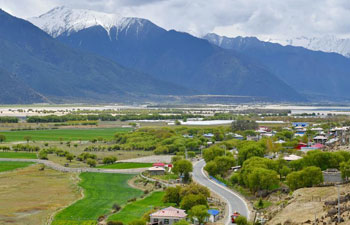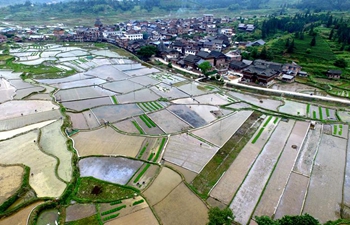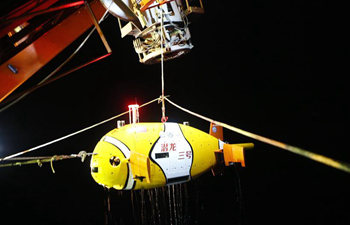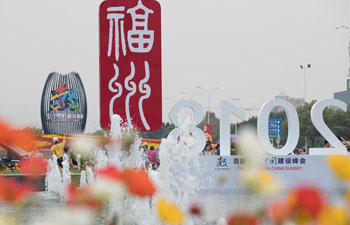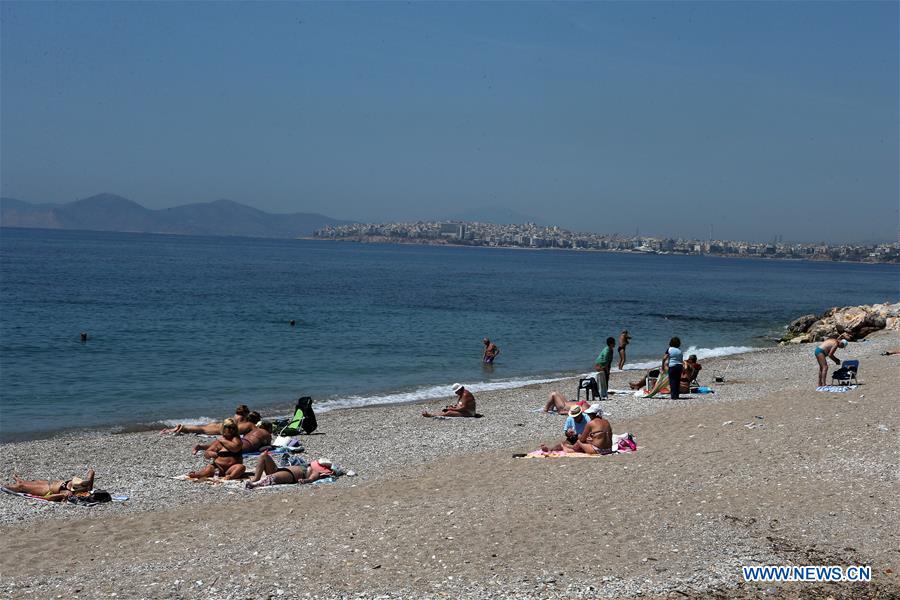
Tourists enjoy the sunshine at a beach near Saronic Gulf, Greece, on April 28, 2018. As temperatures have risen in recent days across Greece and Athenians and tourists try on their swimsuits, local authorities and experts assure them that they can take a dive without exceptions at all the beaches which were sealed off last year after the sinking of an oil tanker off Salamina island. (Xinhua/Marios Lolos)
ATHENS, April 28 (Xinhua) -- As temperatures have risen in recent days across Greece and Athenians and tourists try on their swimsuits, local authorities and experts assure them that they can take a dive without exceptions at all the beaches which were sealed off last year after the sinking of an oil tanker off Salamina island.
Greek owned "Agia Zoni II" sank in September 2017 in the Saronic Gulf, creating an extensive oil spill which affected the shores of southern and western Attica for dozens of kilometers.
Swimming was banned for weeks in many popular beaches, as well as fishing in the area, as titanic efforts were made to deal with the marine disaster.
Nearly eight months later, Greece's Shipping and maritime ministry announced in a press briefing that all restrictions have been lifted, while scientists of the Hellenic Center for Marine Research (HCMR) also officially briefed MPs on Friday on the results of their survey which showed that the beaches, sea, sea bed and benthic ecosystem along the Athens Riviera are pollution free.
The lifting of the ban this April completes the efforts of authorities, cleaning companies and volunteers to restore life in the affected areas, Greek Shipping and maritime minister Panagiotis Kouroumblis said.
In addition to the measurements of Greek scientists who conducted surveys from September until April, he noted that the International Oil Pollution Fund (IOPF) has already released funds for the cleanup works, the scientific research and the compensation of businesses and municipalities affected by the oil spill.
IOPF releases funds only when member countries have done their best to clean up the shores and sea, the minister stressed.
"They have released a total of 51 million euros (62 million U.S. dollars). We told all professionals of the Riviera and municipalities which believe that have been suffered damages by this case to submit requests," he told the press briefing.
"We have imposed a fine of 1.2 million euros," Kouroumblis added, when asked about the repercussions on the shipping company of Agia Zoni II.
On his part, Vassilis Lykoussis, Director of HCMR's Oceanographic Institute, said that the most affected areas were the shores from Salamina to Glyfada in southern Attica and already from December 2017 there were no significant pollution findings and remains of petroleum hydrocarbon.
"We believe that the pollution was limited to the shores and this is why there were no findings at the sea bed. To tell you the truth, we were also surprised, but we did not trace pollution findings at the sea bottom," he told the press conference.
Scientists attribute this pleasant surprise to the fact that the oil spill spread quickly, was washed ashore, and did not sink to the sea bed.
Lykoussis explained that with regards to the sea bottom, researchers used divers and underwater cameras to scan an area of some 25 kilometers at depths of 3-25 meters.
"Regarding swimming, we told authorities that typically our measurements showed normal prices. What we found are the indexes we had in the past years, when people were swimming at the Saronic," the expert said.
"In the majority of fishes our measurements showed also absolutely normal prices. There was only one case of a Mullus barbatus among 60 samples where we found at one point some traces of pollutants," he added.
HCMR scientists used mussels mytilus galloprovinciallis to check the bio-accumulation of pollutants on marine organisms, and systematically collected samples from 70 selected points at depths up to 92 meters which showed no oil remains, he explained.







